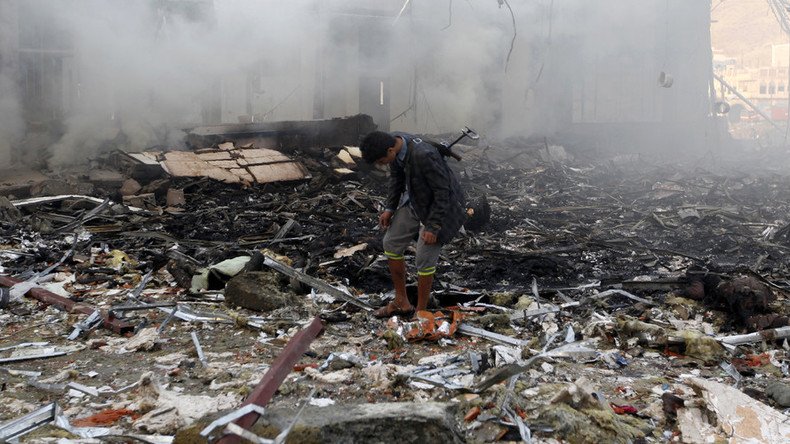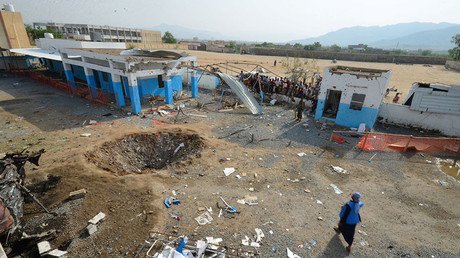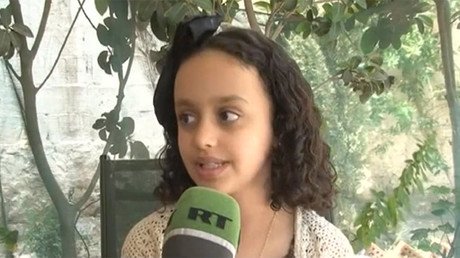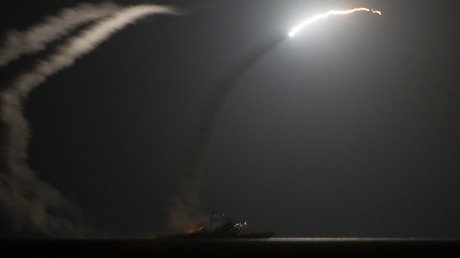‘Apparent war crime’: HRW blasts Saudi carnage at Yemen funeral, slams US & UK arms supplies

Human Rights Watch has accused the Saudi-led coalition of war crimes following an airstrike on a funeral in Yemen, which left at least 110 dead and over 600 wounded. The watchdog has also lambasted the US and the UK for supplying weapons to the Saudis.
On October 8, at least two air-dropped munitions penetrated the roof of a hall containing over 1,000 mourners, killing at least 110 people and wounding 610 during the funeral ceremony of Ali al-Rawishan, the father of the Sana’a-based administration’s interior minister, Jalal al-Rawishan.
“A Saudi Arabia-led coalition airstrike on a crowded funeral ceremony in Yemen’s capital, Sanaa, on October 8, 2016, is an apparent war crime,” Human Rights Watch said, calling the strike "unlawfully disproportionate.”
After interviewing survivors of the tragedy and examining information relating to the strike, the HRW concluded that Saudi strike was a deliberate action – first of all, because the funeral service, which was attended by over 1,000 mourners, has been made public ahead of time via a Facebook post.
“Serious violations of the laws of war committed willfully – that is, intentionally or recklessly – are war crimes. The date and place of the funeral ceremony was announced on Jalal al-Rawishan’s Facebook page on October 7, and would have been publicly available,” HRW said.
While acknowledging that some military personnel, which included Houthi rebels, had been attending the ceremony, the “clear presence” of hundreds of civilians, the NGO argued, is enough to declare the strike a war crime.
“Under the laws of war, an attack is unlawfully disproportionate if it may be expected to cause incidental loss of civilian life or damage to civilian structures that would be excessive in relation to the concrete and direct military advantage anticipated from the attack. Only military personnel and civilian officials involved in military operations against the coalition would be considered legitimate targets,” HRW explained.
While calling for an impartial probe into the funeral strike and other similar incidents, the New York-based organization expressed a strong doubt that the Saudis and their Western allies in the region would conduct an honest investigation into the tragedy.
“After unlawfully attacking schools, markets, hospitals, weddings, and homes over the last 19 months, the Saudi-led coalition has now added a funeral to its ever-increasing list of abuses,” said Sarah Leah Whitson, the Middle East and North Africa director. “An independent international investigation of this atrocity is needed as the coalition has shown its unwillingness to uphold its legal obligations to credibly investigate.”
#Video New evidence from the crime scene (Funeral hall) that was bombed by #Saudi fighters. MK82 guided bomb. #StopArmingSaudi#Yemenpic.twitter.com/iLw6PWO560
— I4Yemen (@I4Yemen) October 10, 2016
The NGO noted that coalition sources initially denied responsibility for the attack, but later vowed to investigate the incident with the aid of the US. The UK has also reportedly requested that it participate in the investigation. The coalition announced that a Joint Incidents Assessment Team (JIAT) would handle the matter.
“However, the coalition has not conducted previous investigations impartially or transparently, nor publicly carried out prosecutions for alleged war crimes, or provided redress for victims,” HRW stressed. “JIAT has not met international standards for transparency, credibility, and impartiality, and the Saudi-led coalition should not only investigate but cooperate with UN investigations into the incident.”
‘Zero accountability’: UN human rights boss repeats call for investigation into #Yemen war crimes https://t.co/iKqa0WeIozpic.twitter.com/SkCjetLjHC
— RT (@RT_com) October 10, 2016
At the same time, the HRW noted that Saudi Arabia, which is a member of the Human Rights Council has previously used its position “to obstruct efforts to establish an international inquiry into ongoing violations in Yemen.” Therefore Riyadh has “no place on the UN body,” Human Rights Watch added.
In addition to the Saudis, HRW found the United States and the United Kingdom indirectly complicit in the deaths of civilians in the strike and the overall severity of casualties in the 19-month long civil war in Yemen.
Since the beginning of the Saudi-led air campaign in Yemen which began on March 26, 2015, the Saudi coalition, with direct military support from the US and assistance from the UK, according to HRW’s record, conducted at least 58 “unlawful airstrikes,” with other human rights organizations and the UN having documented dozens more.
At least 4,125 civilians had been killed and 7,207 wounded in Yemen between March 2015 and October 2016, according to OHCHR, with the majority of casualties coming from coalition airstrikes. Overall more than 10,000 people, including combatants, have been killed in the same time frame, according to the UN figures.
In light of such a heavy civilian casualty toll the NGO called on the US, the UK States, and other governments to “immediately” suspend arms sales to Saudi Arabia after the Human Rights Watch “identified" the munition used in the attack on the funeral as a “US-manufactured air-dropped GBU-12 Paveway II 500-pound laser-guided bomb.”
Human Rights Watch has repeatedly criticized the coalition’s use of US and UK-produced weapons, including cluster munition in Yemen. Yet despite calls by US officials to review its support for its Middle Eastern ally, the NGO noted that US continues to sell arms to Saudi Arabia, approving more than $20 billion in military sales in 2015 alone.
Three US arms sales in 2015 and 2016, worth nearly $3 billion, were used to “replenish” Saudi firepower in Yemen, HRW claims. In addition to the US, HRW blames the UK government of approving £2.8 billion ($3.4bn) in military sales to Saudi Arabia in 2015.
The US, besides arms sales, has been focusing its engagement in Yemen on intelligence sharing, reconnaissance and aerial refueling of Saudi-led coalition jets.
That, however, changed on Wednesday, after President Barack Obama authorized so-called “limited self-defense strikes” which marked the first direct US military engagement in Yemen. Using alleged attacks by Houthi rebels on US destroyers off the coast of Yemen as a casus belli, the Pentagon vowed to protect US personnel, vessels and the “freedom of navigation in this important maritime passageway.”
READ MORE: Iranian warships deployed off Yemen coast after US bombs Houthi targets















